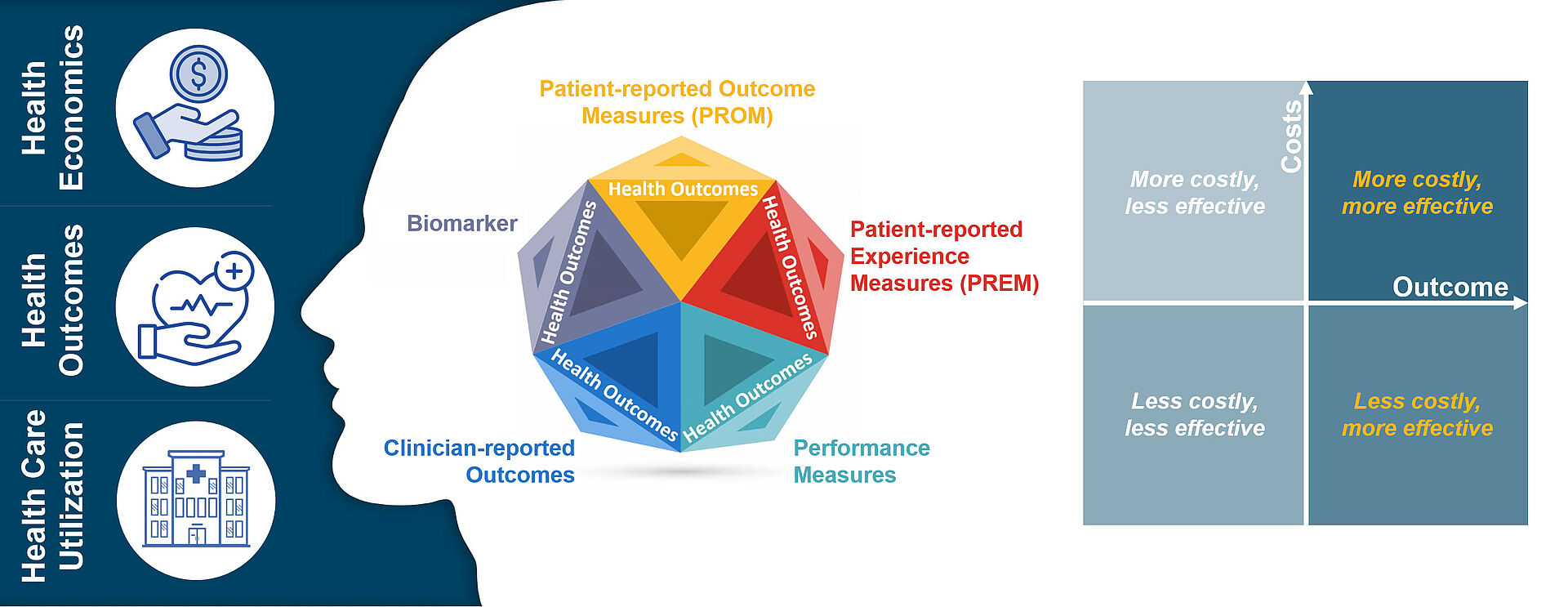Areas of investigation/research focus
Neurodegenerative diseases significantly affect patients', caregivers', and families' lives and cause a tremendous economic burden on healthcare systems. Innovative diagnostic procedures and treatment and care approaches can help to improve patients' and caregivers' health-related quality of life and may relieve the economic burden. Therefore, the working group focuses on patient-reported outcomes and health economic research to foster DZNEs' clinical, healthcare and translational research by addressing the following research areas.
Bridging the gap between DZNEs clinical and health care research
The research group integrates health economic, patient-reported and health-service-related models and instruments into clinical cohorts and sets up new innovative clinical healthcare studies to enhance the understanding of patient- and healthcare-relevant outcomes. This transdisciplinary approach focuses on the impact of different neurodegenerative diseases on patients and the health system. It is relevant to gain essential and in-depth insights into the everyday life of patients and their families and the economic, humanistic and societal burden of such diseases. The research group also identifies determinants of health and social life and efficient use of healthcare resources, crucial to improving patients' and their families' current treatment, care, and everyday life. We use digital methods, like mobile-health apps, and conventional methods to collect such essential data. An example of this research area is the PROFA study.
Patient-reported outcomes measurement (PROMs)
Health-related quality of life (HRQoL) has become a key endpoint in neurodegenerative disease research, emphasizing the importance of valuing the perspective of patients. However, there are tremendous challenges in HRQoL assessments in neurodegenerative diseases. Therefore, the working group's aims are the methodological development, further development and psychometric testing of patient-reported outcome measures in clinical and healthcare research. This mainly includes validating and quantitatively comparing HRQoL instruments and other patient-reported outcome measures (PROMs) in neurodegenerative diseases. An example of this research field is the EQ-5D-ATAX study.
Economic burden of neurodegenerative diseases & within-trial cost-effectiveness analyses
The working group evaluates the economic burden of neurodegenerative diseases on the health care system and society and conducts cost-effectiveness analyses of new diagnostic procedures and interventions considering health economic-, health system- and patient-relevant outcomes. This includes economic analyses of the present healthcare provision situation, assessing costs and the impact of evidence-based and low-value care using primary and routine data from statutory health insurance. An example of this research field is the RegioDem study.
Large-scale implementation
Promoting the translation of research evidence and evidence-based models of treatment and care into healthcare practice by conducting implementation trials across several sites and care settings is also a key pillar of the working group to foster adaptation in the healthcare system, acceptance and adoption by health service providers and support and guide health policy alongside the National Dementia Strategy. The implementation study DCM:IMPact is a prime illustration of this research field.
Stakeholders' engagement in healthcare research
Another essential working group topic is establishing and promoting structures and developing methods to efficiently engage stakeholders in clinical and healthcare research at different DZNE sites. A core initiative is the Translational Network for Healthcare Research in Dementia (TaNDem). The working group is coordinating all activities of the TaNDem, established as a DZNE-wide Health Care Research Platform (similar to the Clinical Research Platform), providing an infrastructure for the interaction of health care research, care practice and those affected by dementia, the planning, execution and evaluation of DZNE-wide multi-site healthcare research studies with standardized data collection, and the implementation of research evidence into practice.


